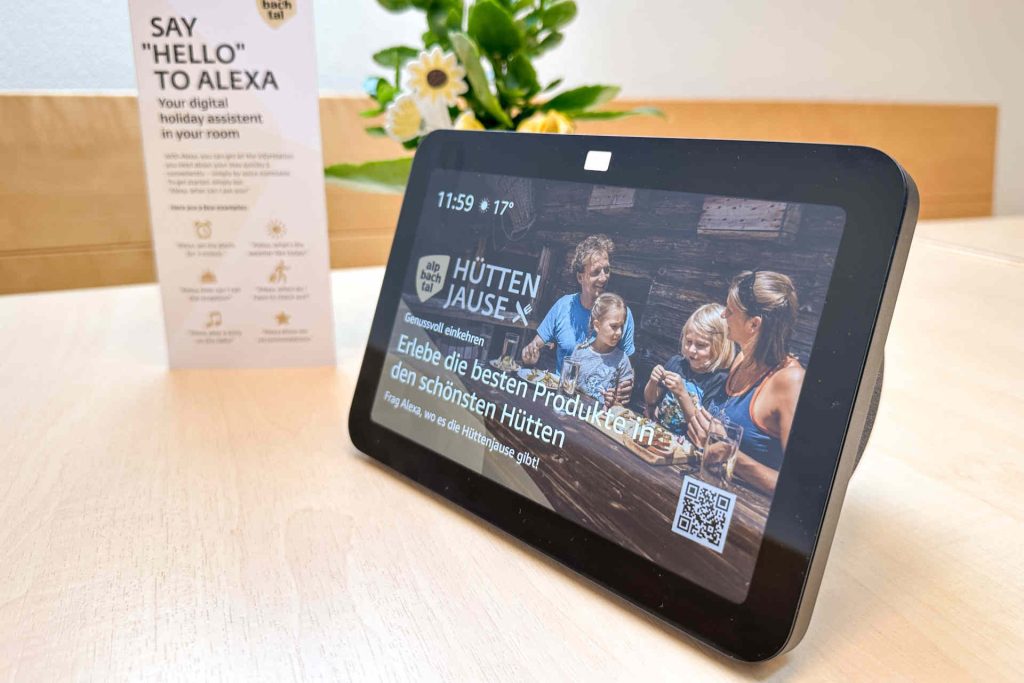
From digital voice assistants to AI-supported training, the hotel and restaurant industry is facing a wave of innovation that is rethinking efficiency, sustainability, and the guest experience in equal measure. Four current initiatives show how future technologies are already changing operations today – and what opportunities businesses can derive from them.
With the “Alpbachtal Voice Concierge” pilot project, which is unique in Europe, the Tyrolean region is taking a big step: 500 Alexa-based devices have been installed in 24 accommodation establishments. They answer questions such as “When is breakfast served?”, book tables in restaurants, or provide information about events – directly by voice, without a reception desk or telephone.
Frank Kostner, chairman of Alpbachtal Tourism, emphasizes: “Routine tasks can be automated in this way. This gives our employees time to focus more on personal service.”
Particularly exciting: a dedicated MICE module for the congress sector. The service was tested for the first time during the European Forum Alpbach with 4,000 guests – a model that could inspire conference hotels across Europe.
Conclusion for businesses: voice assistance relieves teams, offers guests convenience, and, with the congress version, also becomes a real USP for business hotels.
Another field, but just as forward-looking: cleaning. With ReadyDose, Ecolab is launching a revolutionary tablet system. Instead of heavy canisters and complicated dosages, businesses are now turning to handy cleaning tablets that generate up to 98.8% less plastic waste and require 84% less storage space.
Kris Kielsa, Executive Vice President at Ecolab: “ReadyDose is like having a professional cleaning team packed into a tab.”
In addition to simplicity and safety (no PPE required), the system scores points with QR-based training videos in 11 languages – ideal for international teams in the hotel and catering industry.
Conclusion for businesses: Sustainability is becoming part of everyday life. Anyone who wants to make cleaning processes more efficient and environmentally friendly will find a way to save costs, space, and resources here.
While many are still hesitant, the United Interim Economic Report 2025 shows how to successfully get started with AI. Three steps are considered key:
Eckhart Hilgenstock, AI expert and interim manager, warns against false expectations: “It's not about immediately converting the entire company to AI. Rather, use cases must be defined that will pay off within 12 to 18 months.”
Two-thirds of those surveyed see customer communication as the most sensible way to get started: chatbots, voice dialogue systems, or recommendation engines deliver quick wins and increase guest satisfaction.
Conclusion for businesses: Hotels and restaurants should start small – for example, with AI-supported guest communication or intelligent booking optimization – and then expand the systems.
Since August 2025, training has been mandatory in the EU for the use of AI. This also applies to everyday tools such as ChatGPT or Copilot as soon as they are used in sensitive areas.
Alois Krtil, CTO of PINKTUM, warns: “Many people underestimate the fact that even the use of everyday tools can trigger a training obligation. Those who wait risk compliance violations.”
With e-learning modules and certification, the EdTech company PINKTUM offers a scalable solution – important for hoteliers and restaurateurs who use AI in service or administration.
Conclusion for businesses: Those who introduce AI must provide their employees with technical and legal support. Early training creates acceptance, security, and competitive advantages.
The four examples show how broadly digitalization is changing the hospitality industry:
Key learnings for hoteliers and restaurateurs
To ensure that the hotel and restaurant industry remains competitive in the future, it is now important to invest boldly, get employees on board, and see innovation as an opportunity – not a risk.

Takeaway without a guilty conscience – and with social added value: since its relaunch in 2024, the TafelBox has become one of the most effective tools against food waste in Austria. The simple principle: guests take leftover food home with them – and at the same time donate to a good cause. For every box sold, 20 cents go directly to Die Tafel Österreich to provide people affected by poverty with rescued food.
Vienna-based start-up and-less is revolutionizing commercial kitchens with a simple but ingenious reusable idea: Sustainability in the hospitality industry doesn’t start with the guest’s plate – it often starts much earlier, behind the scenes. One example of this is communal catering: every day, thousands of meals are delivered to schools, nursing homes, and canteens in disposable containers, which end up in the trash immediately after being emptied. Barely visible to the public, this creates a mountain of waste that, according to and-less, is equivalent to the area of around 181 soccer fields every year.


From digital voice assistants to AI-supported training, the hotel and restaurant industry is facing a wave of innovation that is rethinking efficiency, sustainability, and the guest experience in equal measure. Four current initiatives show how future technologies are already changing operations today – and what opportunities businesses can derive from them.